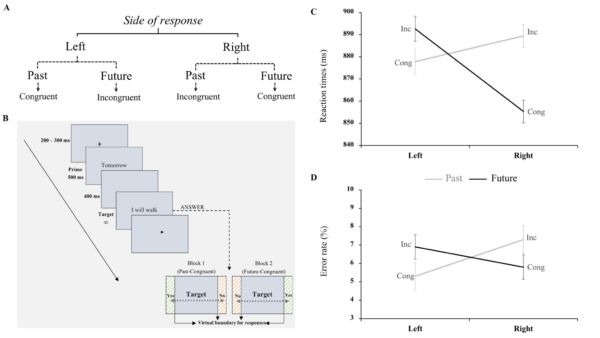|
Dear members of the ILCB,
This is already our 3rd newsletter – time flies! Which brings me right to the featured topic of our newsletter. Can embodied theories of language explain our understanding of abstract concepts, such as time? I’ll let you find out the answer in our featured figure of the month.
Just a gentle reminder, please fill out the project sheets for the GoNoGo evaluation before May 17th; you can find the details in the email I sent on the morning of May 6th.
These project sheets will enable us to synthesize and highlight the scientific advances that have been made thanks to the interdisciplinary dynamics of the ILCB, whether they are the result of direct support (ongoing projects, docs, postdocs, Crex, etc.) or, more generally, of the structuring effect of the ILCB. We may also use them to publish an illustrative appendix (a "4-yearbook") that could be given to the international jury of the GoNoGo evaluation as supplementary information.
A final word about our 2-day retreat, which will still take place on May 25-26. Due to the sanitary restrictions, we are unfortunately limited in the number of people that can be physically present at the LPL (< 35). Priority was thus given to the members of the directory board and the project teams. We will make sure to broadcast the plenary conferences and discussions and we truly hope to organize a big event with all of you once the Covid crisis and the GoNoGo evaluation are well behind us.
Best wishes,
Johannes |
| |
|
"Mes pensées dorment, si je les assis.
Mon esprit ne va, si les jambes ne l’agitent."

Wikisource: La bibliothèque libre
("My thoughts sleep, if I sit them down.
My mind is not fine unless my legs shake it.")
Michel de Montaigne
De trois commerces, Essais, Livre III
le contexte |
| |
|
How do people process words that refer to time? |
|

(A) Basic design for "yes" responses (words). Word position and contingency with mental line are manipulated. (B) Task design. A prime (“yesterday” or “tomorrow”) was followed by a real target word or pseudo-word; lexical decisions were made after the onset of the target by moving a pen on the trackpad towards the left or right. (C) Mean reaction times and mean error rates (D) as a function of response side (left vs. right) and verb tense (past vs. future). Inc: Incongruent, Cong: Congruent. Mean errors were normalized for tense for the graphical representation of the congruency effect. Error bars indicate within-participant standard errors.
It has been argued that time activates spatial representations organized on a left-to-right axis, a mental timeline, where past events would be to the left and future events to the right. If words that refer to past and future events are represented on the same left-to-right mental timeline, then the processing of such words should interfere with hand movements that go in the opposite direction (e.g., leftwards for future words). The data showed that space-time incongruency slowed down movements (i.e., reaction times) and significantly increased error rates. These results suggest automatic activation of a left-right mental timeline during word recognition, reinforcing the claim that abstract words related to time are grounded in movement through space.
Grasso et al. (2021) J Exp Psychol Learn Mem Cogn
|
| |
|
Isabelle Dautriche, CNRS research scientist |
|
Isabelle Dautriche is a CNRS research scientist working at the Laboratoire de Psychologie Cognitive (LPC). Her research focuses on language development and its link to the structure of languages.… |
|
|
|
| |
|
A stimulus-brain coupling analysis of regular and irregular rhythms in adults with dyslexia and controls |
|
Anna Fiveash, Daniele Schön, Laure-Hélène Canette, Benjamin Morillon, Nathalie Bedoin, & Barbara Tillmann |
|
|
|
As time goes by: Space-time compatibility effects in word recognition. |
|
Camille L. Grasso, Johannes C. Ziegler, Jonathan Mirault, Jennifer T. Coull, & Marie Montant |
|
|
|
Transfer, Collection and Organisation of Electrophysiological and Imaging Data for Multicentre Studies |
|
Nicolas Roehri, Samuel Medina Villalon, Aude Jegou, Bruno Colombet, Bernard Giusiano, Aurélie Ponz, Fabrice Bartolomei & Christian-George Bénar |
|
|
|
On the convergence of rank-one multi-target linear regression |
|
Pierre Courrieu |
|
|
| |
|
Décodage de l’attention auditive mesurée par électroencéphalographie et pupillométrie |
|
Daniele SCHÖN (INS) & INRIA |
|
|
|
Mise en place d’un système d’enregistrements simultanés des potentiels évoqués auditifs corticaux et sous-corticaux |
|
Clément FRANÇOIS (LPL) |
|
|
|
Organisation de l'évènement "Treize minutes Marseille" |
|
Valentin EMIYA & Caroline CHAUX (I2M) |
|
|
| |
|
ILCB PhD-student & postdoc day |
| |
|
ILCB PhD-student & postdoc day will have a scientific program from 10 to 17, comprising group presentations, interdisciplinary discussions and short round table sessions.
Save the date: Wednesday July 7th! |
| |
|
Neuroschool / LPC seminar
Embodied simulation and experimental aesthetics.
Vittorio GALLESE
Dept. of Medicine & Surgery – Unit of Neuroscience. University of Parma, Italy
Dept. of Art History and Archeology, Columbia University, New York, USA
May 26 @ 14:30
Read more... |
| |
|
Cocodev seminar series, on Fridays
From pre-linguistic communication to word use in typically hearing and deaf infants
Danielle MATTHEWS
Department of Psychology, The University of Sheffield
May 21st
titles TBA
Ruthe FOUSHEE
Department of Psychology, University of Chicago
June 4th
Riccardo FUSAROLI
Interacting Minds Center, Aarhus University
June 18th
Christina BERGMANN
Max Planck Institute for Psycholinguistics, Nihmegen
July 2nd
Read more...
|
| |
|
ILCB PhD-student & postdoc day
Scientific program from 10 to 17, comprising group presentations, interdisciplinary discussions and short round table sessions.
July 7th
Details TBA |
| |
ILCB is affiliated to Aix-Marseille Université, CNRS, INSERM, and Université d'Avignon
5 avenue Pasteur 13604 Aix-en-Provence Cedex 1 B.P. 80975 +33 (0)4 13 55 36 31
Copyright © ILCB 2021
| |
|